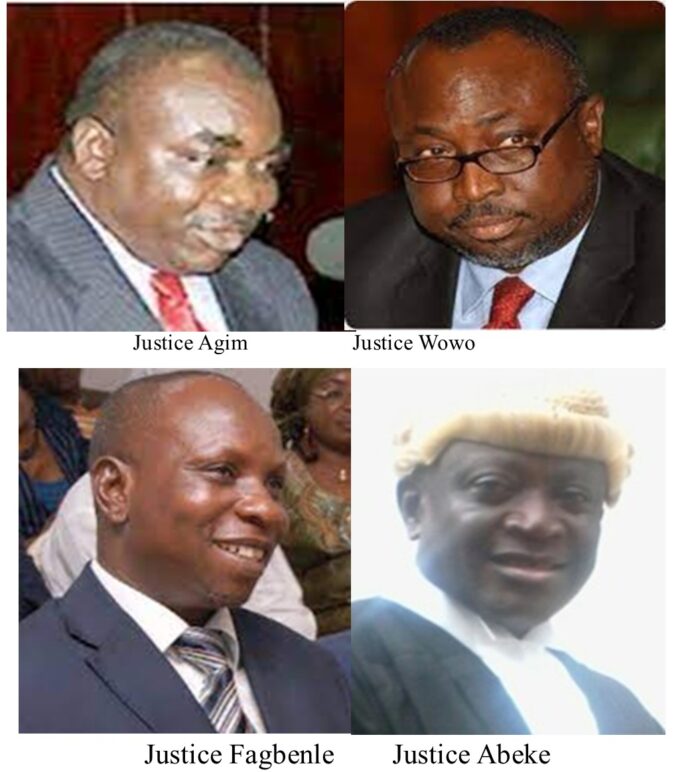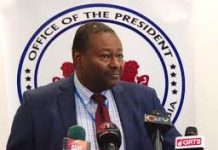By Mustapha Jallow
The Truth, Reconciliation and Reparations Commission (TRRC) has in its report made public, recommended for the ban of ten (10) senior judges who are referred to as ‘mercenary judges’ from holding government office for their alleged roles in allowing ex-president Yahya Jammeh to interfere or use the justice sector institutions, to strengthen his grip on power and entrench his dictatorship.
“Justice Agim, Justice Fagbenle, Justice Wowo, Justice Paul, Justice Nkea, Justice Ikpala, Justice Amadi, Justice Abeke, Justice Kayodeh, Justice Alagbeh as they were then known and all judges who fall under the realms of ‘mercenary judges’ should be banned from holding any public office in The Gambia,” said the truth commission in the report recently made public by the Justice Minister.
The truth commission said the government should review the law on refusal to obey court orders by public officials, with a view to putting in place a more stringent regime that would ensure compliance. It added that the government should study the implications of the fusion of the two positions of Attorney General and Minister of Justice and consider the potential benefits of separating the two functions for more effective administration of justice.
The truth body also recommended for the General Legal Counsel to petition Lamin A.M.S Jobarteh, former Attorney General and Minister of Justice, to be interrogated for his conduct and revoke his practising licence for his role in the unlawful execution of the 9 Mile II death row inmates.
TRRC further recommended that Justice Na Ceesay Salla-Wadda be reinstated, saying her reinstatement be back dated to 2017.
“The reinstatement should substitute the reappointment. Reinstatement will be in line with the rules of restitution and this is consistent with natural justice and fairness and taking into account her long standing service in the justice sector both as State Counsel and Judge,” said the commission. “The government should study the subsisting Decrees saved by Section 7 (c) of the 1997 Constitution with a view to repealing those Decrees that are antithetical to a democratic society.”
According to the commission, Section 141 (2) (c) of the 1997 Constitution which grants power to the President to dismiss judges, should be repealed, as this provision encourages interference by the executive in the judiciary. This, it said, will ensure that there is security of tenure for judges.
It stated that the constitutional provisions on the qualification for appointment of judges should be adhered to, and an independent committee should be set up and supervised by the Judicial Service Commission to screen candidates for the appointment of Judges
“Guidelines regulating the appointment of foreign judges should also be introduced. The government should undertake to at all times respect the Constitutional provisions on judicial independence and the principles of separation of powers as enshrined in the Constitution of The Gambia,” the commission said. “The retroactive effect of the Indemnity Act should be repealed.”
TRRC went on to recommend that the government should put in place institutional arrangements that would ensure greater access to justice by all citizens in the country, especially those in the rural areas.
Meanwhile, the TRRC report said in spite of The Gambia’s adoption of international and regional instruments and domestic laws aimed at ensuring justice in the country, justice sector institutions suffered significantly from interference by former President Yahya Jammeh during his 22-year rule, the commission said in the report.
The commission said Jammeh used the justice sector institutions to strengthen his grip on power and entrench his dictatorship, saying Jammeh achieved this by direct interference in the work of key justice sector institutions, such as the Judiciary, Attorney General Chambers and Ministry of Justice, Gambia Police Force, Prisons and the National Intelligence Agency (NIA).
“Jammeh consistently carried out politically motivated constitutional amendments to entrench himself in power,” the report said.
At the same time, according to the commission, the National Assembly which Jammeh controlled, consistently passed laws pursuant to his agenda to persecute and crush political opponents, dissenting voices and those perceived to present threats to his power.
“To achieve his overriding objective of self-perpetuation Yahya Jammeh systematically used legal mechanisms: constitutional and statutory law in interfering with the work of important justice sector institutions to victimise the population, from senior civil servants, Judges, Ministers, Permanent Secretaries, political opponents, members of his own party, the media, students and the public at large. In so doing he strategically appointed judicial officers, police, NIA and other key decision makers in major justice sector institutions to do his bidding,” said the TRRC 2021 final submitted to President Barrow.
The commission said the use of punitive laws to persecute political opponents and individuals perceived to be threats to Yahya Jammeh’s power, interest or agenda, was normalised under him.
“Jammeh did this by heavily using the criminal justice system to further his objectives through routine malicious prosecutions under the Criminal Code,” said the commission.
The truth body revealed that public officials and opposition members were often charged with providing false information to a public officer, sedition, inciting violence, public disorder, economic crimes, and abuse of office and negligence of official duties, amongst many others.


















